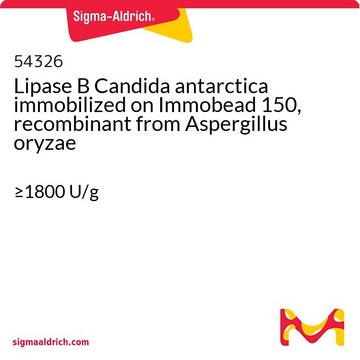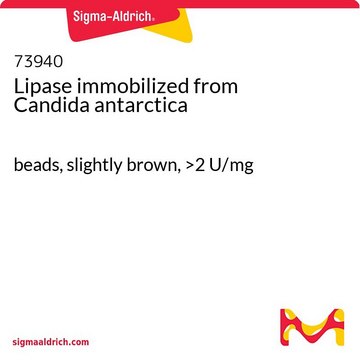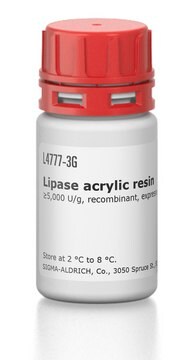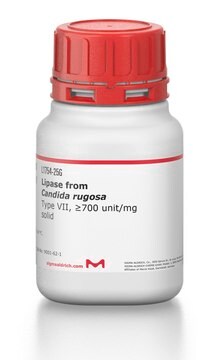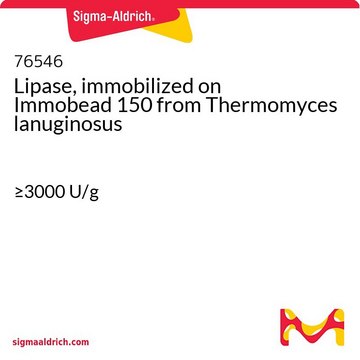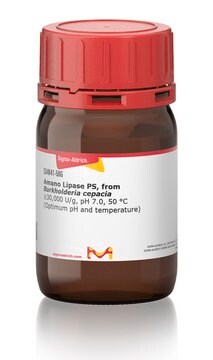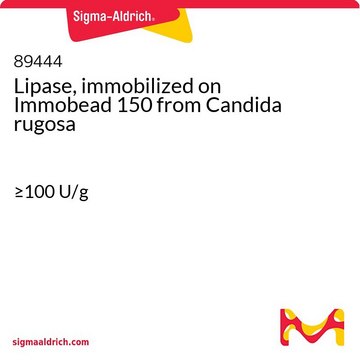52583
Lipase B Candida antarctica immobilized on Immobead 150, recombinant from yeast
≥2000 U/g
Sinónimos:
Candida antarctica Lipase
Iniciar sesiónpara Ver la Fijación de precios por contrato y de la organización
About This Item
UNSPSC Code:
12352204
NACRES:
NA.54
Productos recomendados
recombinant
expressed in yeast
Quality Level
form
beads
specific activity
≥2000 U/g
mol wt
33 kDa
storage temp.
2-8°C
General description
Lipase B or triacylglycerol ester hydrolases belongs to the class of hydrolases. Lipase B from Candida antarctica (CALB) possesses 317 amino acids and a molecular weight of 33 kDa. CALB has a catalytic triad and an open solvent accessible active site. The catalytic triad is usually Ser-His-Asp/Glu which is found in the carboxy terminal of parallel β sheet.
Application
Lipase B Candida antarctica immobilized on Immobead 150, recombinant from yeast has been used:
- in esterification reaction of lauric acid with n-butanol in a biphasic solvent system
- in hydrolysis of fish oil triglycerides
- in screening of enzymes for Morita–Baylis–Hillman (MBH) reaction
Lipases are used industrially for the resolution of chiral compounds and the transesterification production of biodiesel.
Biochem/physiol Actions
Lipases B from Candida antarctica (CALB) is a versatile catalyst for biotransformation reactions. In aqueous media, CALB behaves like an esterase rather than a lipase.
Lipases catalyze the hydrolysis of triacylglycerols into glycerol and free fatty acids.
Lipase B from Candida antarctica has been shown to be an effective catalyst for the synthesis of esters of ethyl D-glucopyranoside from fatty acids larger than octanoic acid. It has also been found to catalyze a wide variety of organic reactions including many different regio- and enantio-selective syntheses.
Unit Definition
1 U corresponds to the amount of enzyme which liberates 1 μmol butyric acid per minute at pH 7.5 and 40°C (tributyrin, Cat. No. 91010, as substrate)
Storage Class
11 - Combustible Solids
wgk_germany
WGK 3
flash_point_f
Not applicable
flash_point_c
Not applicable
ppe
Eyeshields, Gloves, type N95 (US)
Elija entre una de las versiones más recientes:
¿Ya tiene este producto?
Encuentre la documentación para los productos que ha comprado recientemente en la Biblioteca de documentos.
Los clientes también vieron
Kinetics of acyl transfer reactions in organic media catalysed by Candida antarctica lipase B
Martinelle M and Hult K
Biochimica et Biophysica Acta, Protein Structure and Molecular Enzymology, 1251(2), 191-197 (1995)
The sequence, crystal structure determination and refinement of two crystal forms of lipase B from Candida antarctica
Uppenberg J, et al.
Structure, 2(4), 293-308 (1994)
Asymmetric Morita-Baylis-Hillman reaction catalyzed by pepsin
Xue JW, et al.
Journal of Molecular Catalysis. B, Enzymatic, 124, 62-69 (2016)
Thermodynamic study of hydrolysis and esterification reactions with immobilized lipases
Sharma A, et al.
European International Journal of Science and Technology, 4, 128-136 (2015)
Fatty Acid Specificity in Lipase-Catalyzed Synthesis of Glucoside Esters
O. Kirk et al.
Biocatalysis and Biotransformation, 6, 127-134 (1992)
Nuestro equipo de científicos tiene experiencia en todas las áreas de investigación: Ciencias de la vida, Ciencia de los materiales, Síntesis química, Cromatografía, Analítica y muchas otras.
Póngase en contacto con el Servicio técnico
